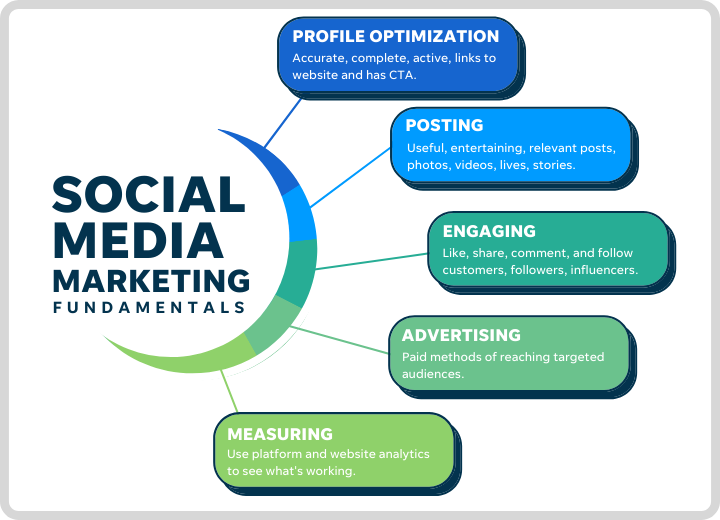In today’s hyper-connected world, the ways businesses reach and engage with their audiences have transformed drastically. Two dominant forces in this transformation are digital marketing and social media marketing. While they often overlap, they serve distinct roles within a comprehensive marketing strategy. Understanding their nuances, benefits, and strategic importance is crucial for businesses aiming to thrive in the digital age.
What is Digital Marketing?
Digital marketing refers to all marketing efforts that use digital channels to promote or market products and services to consumers. These channels include search engines, websites, email, mobile apps, and, of course, social media. It encompasses a wide array of strategies such as:
- Search Engine Optimization (SEO): Optimizing website content to rank higher on search engines like Google.
- Pay-Per-Click Advertising (PPC): Paid ads that appear in search results or on websites.
- Content Marketing: Creating and distributing valuable content to attract and retain a target audience.
- Email Marketing: Sending personalized emails to engage users and drive conversions.
- Affiliate Marketing: Partnering with other businesses or influencers to promote products.
- Mobile Marketing: Reaching users via SMS, push notifications, and mobile-optimized websites or apps.
Digital marketing provides a holistic approach to online engagement, combining data analytics, user experience, and automation to drive measurable results.
What is Social Media Marketing?
Social media marketing (SMM) is a subset of digital marketing focused specifically on platforms like Facebook, Instagram, Twitter (now X), LinkedIn, TikTok, and others. It involves creating, sharing, and promoting content to achieve branding, marketing, and sales goals.
Key strategies in SMM include:
- Content Creation: Designing posts, videos, stories, and reels tailored to each platform.
- Community Management: Engaging with followers, responding to comments, and building relationships.
- Influencer Marketing: Collaborating with influencers to expand reach and credibility.
- Paid Social Advertising: Promoting content using the platform’s ad tools to target specific demographics.
- Analytics and Reporting: Measuring engagement, reach, and conversions to refine strategy.
Social media is uniquely positioned to build brand identity, create two-way conversations, and provide real-time feedback from consumers.

Digital Marketing vs. Social Media Marketing
Though often used interchangeably, digital marketing and social media marketing are not the same. Here’s how they differ:
| Aspect | Digital Marketing | Social Media Marketing |
|---|---|---|
| Scope | Broad – includes all digital channels | Narrow – focuses only on social platforms |
| Channels | Websites, SEO, PPC, email, mobile, etc. | Facebook, Instagram, TikTok, LinkedIn, etc. |
| Objective | Drive traffic, generate leads, convert sales | Increase engagement, brand awareness |
| Strategy | Data-driven, multi-channel, automation-based | Interactive, content-heavy, user engagement |
Social media marketing is essentially a piece of the larger digital marketing puzzle.
Benefits of Digital and Social Media Marketing
Both digital and social media marketing offer substantial benefits for businesses of all sizes:
Benefits of Digital Marketing:
Global Reach: Reach customers worldwide with minimal cost.
Measurable Results: Use analytics tools to track ROI, conversions, and engagement.
Personalization: Target customers based on behavior, demographics, and preferences.
Cost-Effective: Lower cost than traditional marketing, with higher returns.
Benefits of Social Media Marketing:
Direct Engagement: Foster direct relationships with customers through comments, messages, and content.
Brand Loyalty: Consistent, authentic engagement builds trust and loyalty.
Viral Potential: Shareable content can expand reach exponentially.
Customer Insights: Social listening tools provide valuable feedback and market trends.
Key Strategies for Success
To make the most of digital and social media marketing, businesses need a clear strategy. Here are essential tactics:
Set Clear Goals
Determine what you want to achieve: brand awareness, lead generation, sales, or customer retention. Goals should be SMART – Specific, Measurable, Achievable, Relevant, and Time-bound.
2. Know Your Audience
Understanding your target audience’s preferences, behaviors, and needs is vital. Use buyer personas, market research, and platform analytics to tailor your approach.
3. Create Valuable Content
Whether it’s a blog post, video tutorial, infographic, or meme, content must be relevant, valuable, and optimized for your audience and platform.
4. Use Data and Analytics
Track metrics such as click-through rates (CTR), engagement rates, conversion rates, and customer lifetime value (CLV) to evaluate performance and refine strategies.
5. Embrace Automation and AI
Tools like email marketing automation, chatbots, and AI-powered ad targeting can enhance efficiency and personalization.
6. Stay Updated with Trends
Both digital and social media landscapes evolve rapidly. Staying ahead of trends ensures relevance and competitiveness.
Emerging Trends to Watch
As technology and consumer behavior shift, several trends are shaping the future of digital and social media marketing:
- Short-Form Video Dominance: Platforms like TikTok and Instagram Reels continue to drive engagement.
- AI and Machine Learning: Personalization, chatbots, and predictive analytics are being powered by AI.
- Voice Search Optimization: With smart speakers and voice assistants, optimizing for voice is becoming essential.
- Sustainability Messaging: Consumers are gravitating toward brands with clear values and eco-conscious messages.
- Social Commerce: Direct shopping via social platforms is streamlining the path to purchase.
- Digital Marketing and Social Media Marketing:
Conclusion
Digital marketing and social media marketing are integral to modern business success. While digital marketing casts a wide net across various online channels, social media marketing zeroes in on platforms where real-time interaction and brand personality thrive. Together, they offer a powerful toolkit for reaching audiences, driving engagement, and achieving business goals in the digital age.
Whether you’re a startup, small business, or enterprise, understanding and integrating both strategies can unlock unprecedented growth and long-term customer loyalty. As the digital landscape continues to evolve, so too must the strategies used to navigate it.
Digital Marketing and Social Media Marketing: